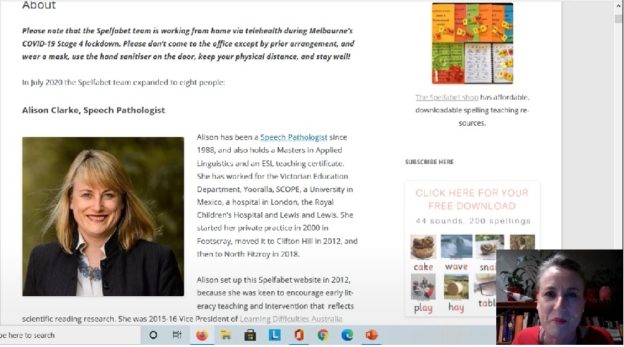Telling the Spelfabet story
3 Replies
You might have seen the recent, excellent guest posts on La Trobe University academic Emina McLean’s blog by teachers, telling their stories about discovering the science of reading. If you haven’t read them, her blog is here, and the posts so far are:
- Keep the balance, Sheryl, keep the balance (Sheryl Ferlito)
- Knowledge is Power (Brooke Wardana)
- This is personal (anonymous)
- My long journey towards the science of reading (Shaun Killian)
- I was told to immerse the child in print (Julie Mavlian)
- Seeing the light (anonymous)
Emina also writes about what research shows does and doesn’t work in getting people to change their minds and their practice, which is pretty consistent with one of my favourite YouTube videos:
Since stories are more powerful than facts, I’ve decided to have a go at communicating my Spelfabet story: realising a lot of my clients couldn’t read because they hadn’t been systematically and explicitly taught to decode/encode words, teaching them successfully and setting up my website to share this knowledge and related strategies, resources and research.
Instead of a blog post, I have made a nearly nine minute (yeek! Too long! But it’s hard to cut back) video, which is now on my website home page. I hope it helps encourage others to also share their stories and connect with each other in a No-Shame zone, realising that we’ve all made mistakes and missed opportunities, are all always doing our best, and that (as the good folk at the US Reading League say) when we know better, we do better. Here it is:
Thanks to Emina for her excellent, strategic insight (she might still be looking for guest posts if you have an inspiring story you’d like to tell!), her storytellers, and also to former colleague Nicole Erlich who bought me the book “The Influential Mind” a few years ago, and I didn’t pay as much attention to it as I should have (another mea maxima culpa, I’m not even a Catholic, sigh).
We’re still in COVID-19 Stage 4 lockdown here in Melbourne, but had only 14 new cases today (huzzah!) so fingers and toes crossed the end is in sight. Stay well!



“Vital social justice measure”: such a key message for all educators! I really don’t believe the vast majority of school leaders get the moral imperative of teaching reading properly.
I have been an avid follower of yours since the beginning & have learned so much (despite being fed the opposite through professional learning offered by the Dept of Education NSW). I really appreciate all the work you have done to improve practice. You’re a champ!
Thankyou, Lyn. I’m assuming you’re an educator, and if the change we need is to be sustained over time, it will need to be educator-led, with people like me in the cheer squad and support crew. So good on you too, everyone on team Reading Science is a champ in my view! Alison
Thank you for this journey. The truth is that I rarely see references to Diane McGuinness, so this is always exciting for me. Like you, I was inspired by Why Our Children Can’t Read and What We Can Do About It, which I discovered when I was making the transition from high school English teacher to elementary school reading specialist. That book, plus her two others (particularly Early Reading Instruction: What science really tells us about how to teach reading), bolstered me in ignoring much of what was promoted in my reading specialist credential program. Thanks for all your hard work!
Harriett